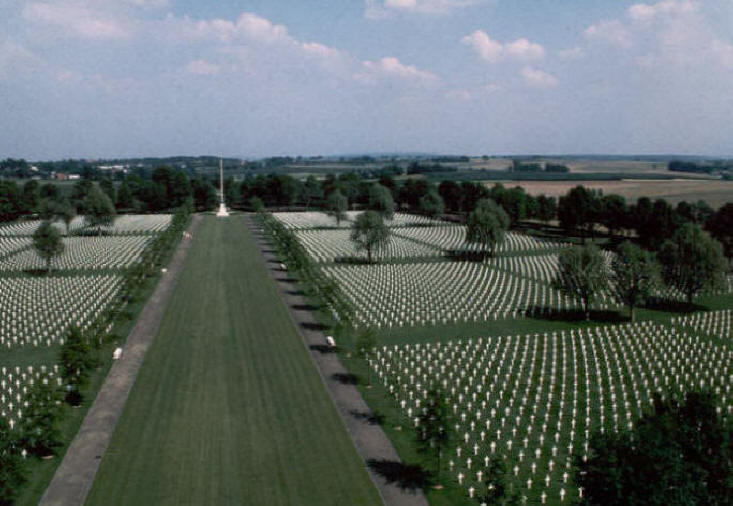Dutch Citizens Still Adopt Graves at Margraten, Netherlands American Cemetery

Intro
The Dutch people (among many other countries and peoples) suffered greatly during WWII. Their country was occupied and ruled by the German forces for nearly the entire duration of the war. Under the circumstances, they had no alternative but to hope for the military assistance of the Allied forces to come to their rescue.
per Wikipedia (excerpted)
Hunger Winter
German soldiers guarding food dump established in forward area, talking to one of the Dutch drivers who is to distribute the food in a Canadian truck. May 3, 1945Main article:
The winter of 1944–1945 was very harsh, which led to ‘hunger journeys’ and many cases of starvation (about 30,000 casualties), exhaustion, cold and disease. This winter is known as the Hongerwinter (literally, “hunger winter”) or the Dutch famine of 1944. In response to a general railway strike ordered by the Dutch government-in-exile in expectation of a general German collapse near the end of 1944, the Germans cut off all food and fuel shipments to the western provinces in which 4.5 million people lived. Severe malnutrition was common and 18,000 people starved to death. Relief came at the beginning of May 1945.[42]
Liberation
Member of the
and “moffenmeiden” being rounded up
After crossing the Rhine at Wesel and Rees, Canadian forces entered the Netherlands from the east, liberating the eastern and northern provinces. The western provinces, where the situation was worst, however, had to wait until the surrender of German forces in the Netherlands was negotiated on the eve of May 5, 1945 (three days before the general capitulation of Germany), in the Hotel de Wereld in Wageningen. Previously the Swedish Red Cross had been allowed to provide relief efforts, and Allied forces were allowed to airdrop food over the German-occupied territories in Operation Manna.[43]
On the island of Texel, nearly 800 men of the Georgian Legion, serving in the German army as Osttruppen, rebelled on April 5, 1945. Their rebellion was crushed by the German army after two weeks of battle. 565 Georgians, 120 inhabitants of Texel, and 800 Germans died. The 228 surviving Georgians were forcibly repatriated to the Soviet Union when the war ended.
After being liberated, Dutch citizens began taking the law into their own hands, as had been done in other liberated countries, such as France. Collaborators and Dutch women who had had relationships with men of the German occupying force, called “Moffenmeiden” were abused and humiliated in public, usually by having their heads shaved and painted orange.[citation needed]
Casualties
By the end of the war, 205,901 Dutch men and women had died of war-related causes. The Netherlands had the highest per capita death rate of all Nazi-occupied countries in Western Europe (2.36%).[44] Over half (107,000) were Holocaust victims, deported and murdered Jews. There were also many thousands of non-Dutch Jews in the total, who had fled to the Netherlands from other countries, seeking safety. Another 30,000 died in the Dutch East Indies, either while fighting the Japanese or in camps as Japanese POWs. Dutch civilians were also held in these camps.[45]
Memorial Day 1945 Margraten
The first day of remembrance of the American lives lost in the liberation of Holland was on May 5, 1945 at Margraten at the new and rough cemetery.
The following silent video solemnly portrays the outpouring of gratitude by Dutch citizens of all ages. When you think of how profoundly different the Dutch life would be now that the country was free from the oppression which had just recently ended, it is understandable how grateful they were. And they are still grateful.
Watch and feel the emotion of the people.
I found this video very sobering as I tried to imagine how close oppression, war and deprivation were to these newly freed people.
What amazes me is that they are still deeply grateful 70 years later.
Margraten Today – Still Respecting Lost American Lives
Our Memorial Day
With the Dutch experience of war and their continuing gratitude for the allied sacrifices that brought them liberation and freedom that has remained until today, I confess that I experience our Memorial Day differently from the Dutch.
They were liberated from the actual horrors of war.
I haven’t actually experienced war, let alone war in my own country.
That seems to make all the military preparations we take, first of all to defend our homeland, and then to deter aggressive behaviors elsewhere in the world, less real and urgent compared to anyone who has lived through war in their own country and city and neighborhood.
This seems to be the mood of our country – tired of conflicts that entangle us in the Middle East and elsewhere. But if having war come to our homeland is made any more likely by a lack of resolve to deter aggressive behaviors around our world, then our military strength and resolve and interventions are surely in our national interest as well as in the interest of those being threatened.
My brother fought in the Korean Conflict in the 1950s and his experience left some lifelong effects. He enlisted in the Army and he never begrudged his service. He was proud of his service and we, his family, are proud of him.
I try to spend at least part of my Memorial Day in serious contemplation and in a mood of gratitude for those who have fought and died to bring America into being and to preserve it as a free nation for me and my family.
The price of my freedom has been high and I want my gratitude to match it, like the gratitude of the Dutch people.
Etc.
Please use the Share Buttons and/or email the link below directly to your friends.
Dutch Citizens Still Adopt Graves at Margraten, Netherlands American Cemetery
Thanks! – Dick S




